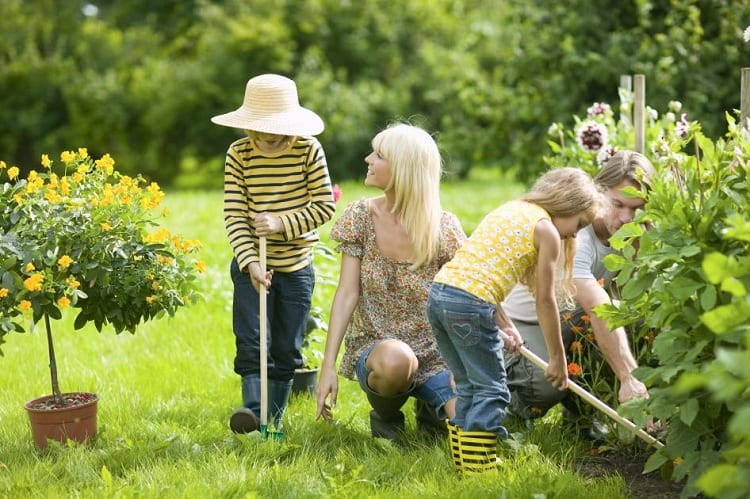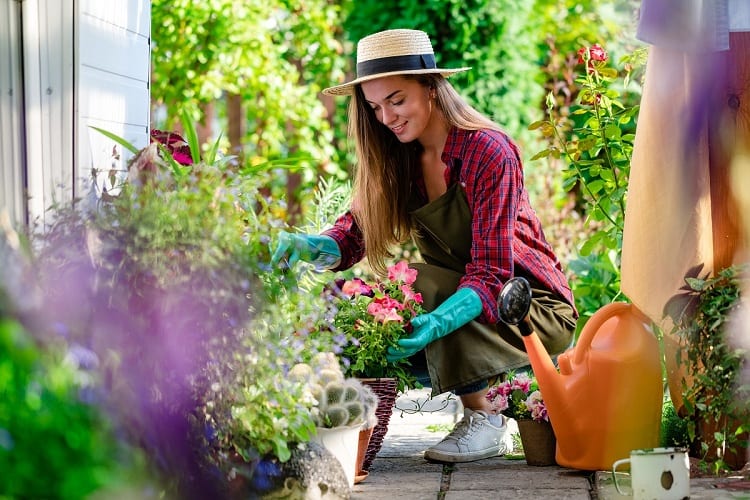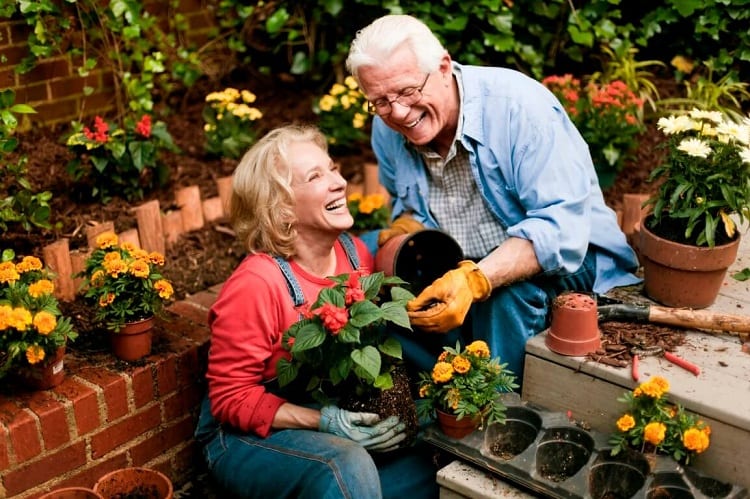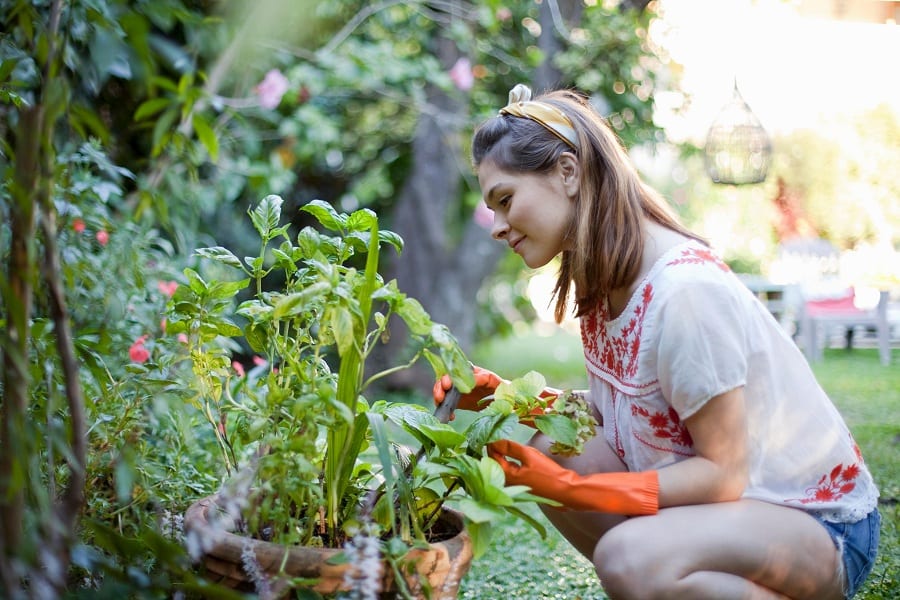When it comes to healthy habits, gardening would have to be up there with one of the best.
This treasured pastime is more than just a hobby or way to make your home look good, but also one of the best things you can do for yourself both physically and mentally.
By now, most people understand the wealth of health benefits that gardening has to offer, among them the feelings of reduced stress and more energy just by being out in nature.
However, it also comes with a lot of physical benefits and is a great way to get your daily exercise in.
Is gardening a good workout?
Yes, it’s possible to get fit from gardening, and even the Center for Diseases Control and Prevention classifies gardening as a form of physical exercise.
Not only is it beneficial for the physical benefits but it gives you access to more nutritious food if you grow your own vegetables, and offers mental health benefits as well.
There’s more to this beloved hobby than just calculating calories burned gardening, and we’re here to show you why.
This guide will explore all of the health benefits of this pastime and how it can give your physical fitness a boost, all the while having fun and getting the satisfaction of growing your own garden.
Table of Contents
How Difficult is Gardening?

Gardening is a hobby shared by people of all physical capabilities, ages, genders, and backgrounds, and it’s a truly immersive activity that everyone can do.
Depending on what you’re doing in the garden, you can get a minimal workout or push yourself to the limit and really get your sweat on.
Like any other skill, it takes time to learn the basics of gardening, but it’s easy enough to jump right into even if you’ve never done it before.
Even something as simple as pulling weeds will give you a workout, and it can be more physically taxing than it appears at first glance, while also being satisfying to do.
Some parts of gardening require more physical exertion, like moving rocks and hauling dirt, and they can be difficult if you’re not in shape.
However, you can work your way up to these more challenging jobs with everything else gardening has to offer, like mowing the lawn, sowing seeds, planting flowers, and pulling weeds, while still getting a good workout.
The Health Benefits of Gardening
When we look into the health benefits of an activity, most people assume we’re talking about the physical ones, but that’s not always the case.
Most forms of physical activity come with benefits for the mind as well, and gardening is a prime example of this. Here are some reported benefits you’ll enjoy, both mentally and physically, when you take up gardening:
- Gardening is good for heart health and as part of a regular exercise routine can reduce your risk of heart disease, hypertension, and other related conditions thanks to its cardiovascular benefits.
- Being out in nature is great for mental health, reduces stress, and rejuvenates the mind, so it’s not all about the physical gains with gardening.
- Incorporating your family and friends into a gardening session teaches others about sustainability, the environment, and is a fun physical activity you can do together.
- Muscles are worked out constantly in a regular gardening session thanks to all the bending, kneeling, squatting, lifting, and digging that goes on.To get the most of it, watch your form just as you would at the gym and try to mix things up a bit.
- Being in the garden can give you a boost of vitamin D thanks to sun exposure, but it’s important to still practice sun safety. Vitamin D builds calcium which is good for bone health, and this becomes more of a pressing issue as you age.
- Having access to your own farm-to-table system improves your everyday diet. By having vegetables on hand that you grew yourself, you’re more likely to incorporate them into meals and eat more of them.
- The satisfaction earned from growing something or making a garden look nice can give you a huge boost of self-esteem. This is one chore that will help your confidence soar and improve mental health along with it.
How Many Calories Does Gardening Burn?

Most people enjoy a regular gardening workout without realizing it’s an effective form of burning calories.
As there is so much satisfaction with the job as well as the other benefits we mentioned, you might not even feel that you’re burning off so many calories just by pulling weeds or moving rocks, but you most certainly are.
According to WebMD, gardening gives you an effective cardio workout while also working your muscles.
Depending on what you’re doing in the garden and how long you do it for, you can expect to shed some serious calories:
- 400 – 600 calories per hour: Moving rocks, hauling dirt, working with landscaping
- 250 – 350 calories per hour: Mowing the lawn
- 200 – 400 calories per hour: Weeding, planting seeds, digging in the garden
- 350 – 400 calories per hour: Raking, collecting leaves, mulching the garden
As you can see, even just spending half an hour tending to your garden, pulling a few weeds, and then mowing the lawn can burn some serious calories.
For most people, this is a standard weekend occurrence but if you’re looking to lose weight or increase your energy output, you could start making gardening part of your daily routine.
Weight Loss and Gardening
One of the biggest challenges with losing weight is feeling like you’re forced to workout or do something you don’t want to do.
The key here is to instead find something that you love, so that it doesn’t feel like a punishment, but instead an activity that you look forward to doing.
For many people, gardening is such a hobby, and spending just half an hour a day out in the yard can provide you with an adequate workout that you’ll actually love.
When you combine this regular physical activity with a balanced diet, it’ll be much easier to lose weight and reach the health goal you’ve set for yourself.
Considering that 30 minutes of physical activity in the garden will burn between 100 to 200 calories, that’s a great number to work with and akin to walking or other forms of cardio.
There are loads of online resources that help you calculate your personal BMR so you know how many calories you should aim to consume a day for your weight if a loss is your goal, and then you can add in a regular gardening routine as your choice of physical activity.
A Healthy Habit for Life

There are so many wonderful benefits to be found from gardening, and this is true whether you’re an everyday green thumb or just like to get out into the backyard now and then to tidy things up.
You’ll find a range of health benefits for body and mind, and it’s a great way to burn calories without even feeling like you’re exercise.
If you’re looking for a workout that’s fun, invigorating, and satisfying, gardening is a great choice, and it comes with loads of benefits for the wildlife that surrounds your home, too.
Not only will you get your yard looking beautiful but you’ll be doing your body and mind service as well.
Related Questions
Gardening is a wonderful pastime that not only has benefits for your own backyard but also for your body and mind.
If you’ve been thinking about how a regular gardening hobby could help you out, we’ve got the answers to some commonly asked questions to point you in the right direction.
Before you jump into creating a garden bed or growing flowers, you can first clean up the areas you already have.
Pull the weeds, cut the grass, and source out a site that’s got adequate sun and shade so you can plant a garden that will thrive in those conditions.
With the real estate in mind, you’ll be able to prepare a healthy soil base and go from there.
There are a few basic tools you can use when you start gardening, including gloves, a rake, access to a nearby water container or hose, and healthy soil.
With these, you can grow whatever seeds or plants you’ve chosen, and then upgrade or add to your tool collection as your skills and garden progress.
If you’re starting your first vegetable patch, there are some veggies known as beginner-friendly that are easier to maintain.
Choose simple plants like tomatoes, radishes, potatoes, peas, and courgette to start with, but make sure you’ve chosen vegetables that suit the climate and conditions where your garden is.
Recourses:

